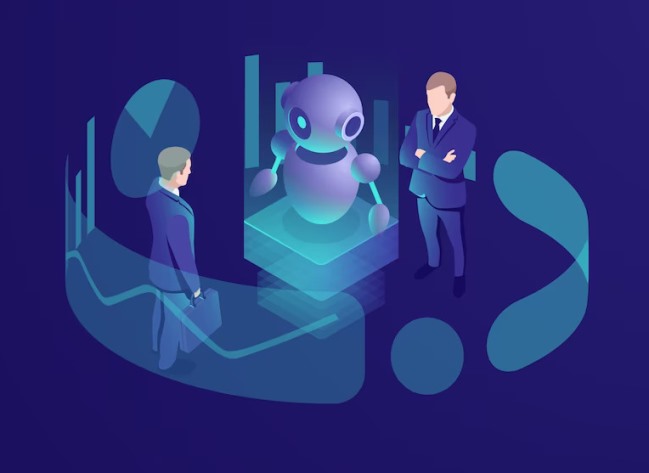Artificial Intelligence (AI) holds the capability to revolutionize the manufacturing sector entirely. It brings many benefits such as heightened efficiency, reduced costs, improved quality, and minimized downtime.
Large-scale manufacturing facilities are among those that gain a lot from the adoption of this technology. Smaller enterprises must recognize the accessibility of high-value, cost-effective AI solutions.
The applications of AI in manufacturing are diverse. Read this blog until the end to learn everything there is to know about AI in manufacturing.
AI in Manufacturing
In manufacturing, a lot of data comes from smart factories and industrial IoT daily. Artificial intelligence (AI), like machine learning (ML) and deep learning neural networks, helps analyze data and make better decisions.
AI in manufacturing is often used for predictive maintenance. It means using AI on production data to predict failures and plan maintenance, making it cheaper for production lines.
There are more ways AI benefits production, like predicting demand more accurately and reducing material waste. AI and manufacturing work closely together because humans and machines need to collaborate in industrial settings for better work outcomes.
Read Also: Facial or Fingerprint Recognition: Which one is better?
Steps of Applying AI in the Manufacturing Industry
Applying artificial intelligence in manufacturing involves several key steps.
Observation of Human Actions
Firstly, the AI is taught tasks by observing human actions, ensuring both progress and sustained growth. With time and practice, it becomes capable of independently performing a variety of tasks without constant supervision.
Crowdsourcing
The next step is crowdsourcing, where data is collected from the general public to train the AI swiftly. This allows the AI to tap into collective wisdom, essentially creating a “hive mind” and gaining access to a vast reservoir of knowledge.
Unsupervised Learning
Finally, unsupervised learning enables AI to acquire knowledge without specific instructions. Utilizing reinforcement learning, the AI can autonomously pick up new information, marking a significant stride towards achieving unsupervised AI supervision.
Advantages of AI in Manufacturing
AI has numerous advantages in manufacturing. Here are some of them discussed below.
Streamlining Operations
AI plays a pivotal role in predictive maintenance, a proactive approach that helps manufacturers anticipate equipment failures. Through the analysis of historical data and real-time monitoring, AI predicts when machines may require maintenance, reducing downtime and increasing overall efficiency.
Precision and Reliability
AI plays a very important role in streamlining operations. For example, industries that use mechanical seals in rotating machinery like pumps, compressors, and mixers can take great help from AI for predictive maintenance. These components prevent fluid leaks by creating a static seal between the rotating shaft and the stationary housing of the equipment.
The robotic algorithm will analyze data from sensors monitoring the condition of the seals, looking out for potential failures. It shall also predict when maintenance or replacement might be need.
Enhanced Quality Control
Manual inspection of products has now become a thing of the past. AI, powered by computer vision, has revolutionized quality control processes.
Cameras and sensors equipped with AI algorithms can detect defects in real time, ensuring that only high-quality products reach the market. This not only improves product reliability but also reduces waste and production costs.
Optimizing Production Processes
AI optimizes production processes by analyzing vast amounts of data to identify bottlenecks and inefficiencies. By making real-time adjustments, manufacturers can enhance productivity and resource utilization. This leads to cost savings and improved competitiveness in the global market.
Supply Chain Management Reinvented
AI is reshaping the way manufacturers manage their supply chains. From demand forecasting to inventory management, AI algorithms provide accurate insights, enabling companies to maintain optimal stock levels and respond swiftly to market changes. This results in reduced costs and improved customer satisfaction.
Collaborative Robots (Cobots)
Collaborative robots or cobots have been gaining a lot of popularity working alongside human operators. These robots are equipped with AI and can perform tasks that are repetitive, dangerous, or require precision. Cobots not only enhance efficiency but also contribute to a safer working environment for human workers.
AI-Driven Design and Prototyping
Designing and prototyping are critical stages in manufacturing. AI accelerates this process by generating design alternatives based on specified criteria. This not only speeds up innovation but also leads to the creation of more efficient and cost-effective products.
Energy Management for Sustainability
Manufacturers are increasingly focused on sustainability, and AI aids in achieving energy efficiency. Smart algorithms analyze energy consumption patterns, suggesting ways to minimize waste and reduce environmental impact. This not only aligns with corporate social responsibility but also helps cut down operational costs.
Final Thoughts
The addition of AI into manufacturing processes promises increased efficiency, sustainability, and innovation. As technology advances, manufacturers need to embrace AI, recognizing its potential to reshape the industry.
The journey towards an AI-driven manufacturing future is underway, and those who adapt stand to gain a competitive edge in the dynamic global market.
